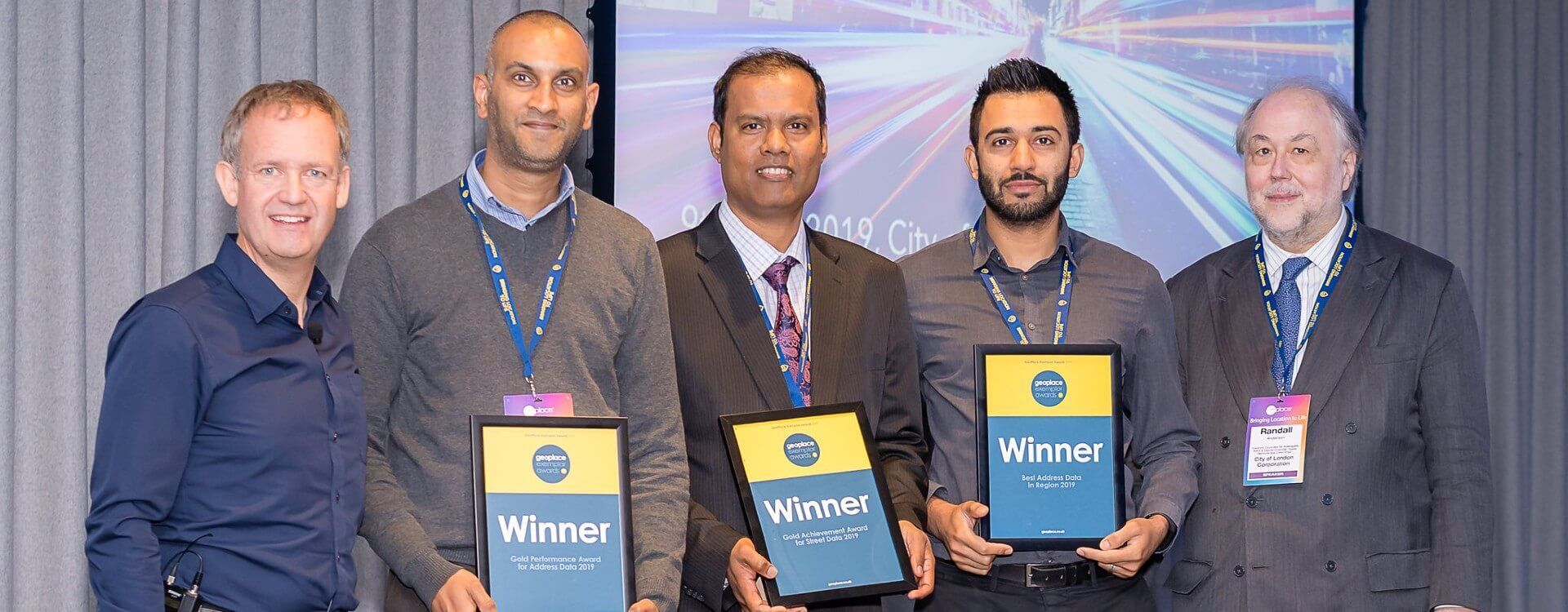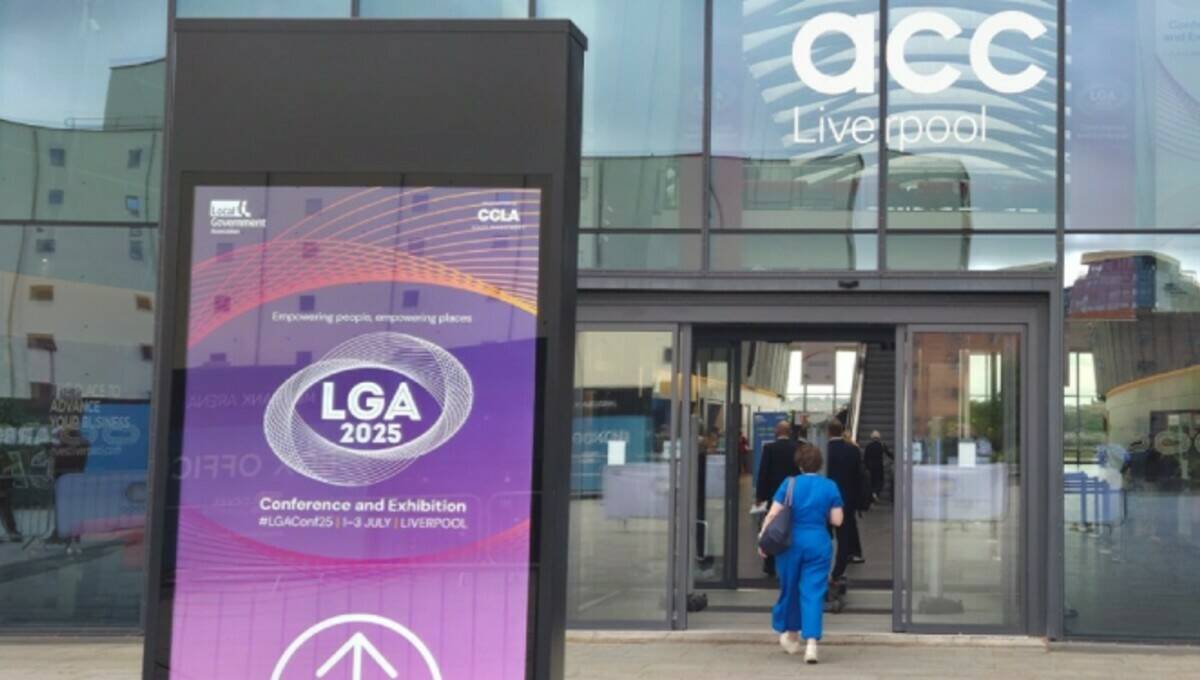Data is the new currency. It drives our processes, guides our decisions, and is increasingly recognised as not just an internal resource but a product which can help generate revenue, increase transparency and spur innovation.
Introduction
The power of community

Managers and executives now increasingly recognise that a strategic approach to data is required. These strategies typically highlight the investments needed in business, data, technology and applications to support their organisational strategy. The best data strategies go further: recognise that understanding and investment is also required in two further areas:
- people and
- community
Failure to put in place a strategy to harness the potential of people and community will not result in failure. However, it may mean that only pockets of success are achievable and that your strategy will not lead to:
- scalability,
- transformation or
- sustainability
GeoPlace LLP has first-hand experience in creating communities based on a common interest in data, where members can amplify the impact of their work. This does not happen by accident - it can only happen with a deliberate and coordinated approach to community building.
A well-established body of work describes best practice in the field of data management. However, the idea of a data community is less well-established and thought leadership on the topic is scarce.

GeoPlace is a public sector limited liability partnership between the Local Government Association (LGA) and Ordnance Survey. For over fifteen years we have been at the centre of the address and street data communities within England and Wales. We work with a range of partners including all 348 address contributing authorities, and all 174 highways authorities, the Joint Authorities Group (UK) and Ordnance Survey. We come together to share best practice and agree on common standards. This allows us to turn local datasets into nationally critical assets, deliver robust and efficient solutions and develop a louder voice to central government and other parties.
In 2011 GeoPlace was awarded winner in the “Quality and Quantity” category in the Spatial Data Infrastructure best practice awards by EUROGI – the European umbrella organisation for Geographic Information who commented on the distinctive nature of our community- based approach.
This paper is aimed at those responsible for defining and delivering a data strategy and describes the community approach to data. It is based on many years of accumulated experience of facilitating and coordinating the address and street data communities.
The paper will explore the four guiding principles for a successful data community:
- common purpose
- engagement
- momentum
- support
The paper will outline an approach for those responsible for supporting the community in delivering a successful strategy.

Common purpose
Mutual support
A community can form around a shared interest. In the most obvious example, this can be simply that we live in the same city, town or village – in our context, it is around a shared interest in a type or use of data.
Across England and Wales, a community has formed around a shared interest in address and street data. Within each local authority, there is a custodian of address and/or street data. By forming a community these custodians have enjoyed many benefits, including:
- knowledge sharing
- support
- problem solving
- personal development
- networking
- recognition and kudos
For some, the benefit is social – an opportunity to meet new people and share ideas, experiences, problems and solutions. Members enjoy the chance to get a helping hand – a small gesture can make
a big difference to those facing seemingly challenging problems – and equally members enjoy giving a helping hand to those who need it. Members may simply receive an affirmation that their idea is a good one and the confidence to go back to the office and go for it. Sometimes, simply, a problem shared is a problem halved.
At other times, a member may be faced with a problem and the community may be able to provide a solution – either by working together or because somebody has previously solved the same problem (which is often the case).
At other times, a member may be faced with a problem and the community may be able to provide a solution – either by working together or because somebody has previously solved the same problem (which is often the case).
Being part of a community can offer the opportunity for external recognition either from their peers
or from a central authority. GeoPlace organises an annual awards ceremony which provides a great opportunity for custodians to receive certification of the quality of their data or the impact they have achieved through the use of the data. For some this is a purely personal satisfaction – others are more competitive!

A part of something bigger
Many people also find that membership of the community helps their personal development, networking and feel an amount of kudos resulting from being involved at the national level.
Members of a community often enjoy the chance to be a part of something bigger. When they feel this way, they put their heart into it because they believe in it. Common purpose is the key to harnessing the full potential of those in the community – and to achieving the biggest impact.
This supportive environment, helping people with their existing commitments as part of their “day job” has been a huge success. However, it is only half of the story. In addition to the shared interest in their day-to-day roles, the community coalesced around a larger, shared goal: to create both a national spatial address gazetteer and a national street gazetteer for use across the whole of the public and private sectors in Great Britain.
It is this common purpose which gave people a reason to act together to achieve a bigger goal – for example to:
- define common data standards, and
- standardise data entry conventions, and
- agree formats for data exchange, and
- commit to yearly quality improvement targets, and
- develop a national hub to validate, host and distribute the data efficiently
Agreeing a common purpose provided a focus – no community can provide all things to all people, but by agreeing on the primary purpose members can focus their efforts on the same idea and maximise their chance of success.
As a result, every local authority across England and Wales submits standardised and consistent data to a national hub. From here the data is distributed across the public and private sectors for use in public safety, the national census, risk management and fraud detection among many other applications.

Engagement
We work to our potential when we are committed to our goals, motivated to achieve them and feel we have the right conditions to do well. This is as true in a community setting as in any other aspect of our life – and this is what we mean by engagement.
When we talk about data, words like passion, energy and trust are not always the first to fall from our lips. However, they are among the most important if we wish to make a difference through our work. All of these are required to help motivate us through the “hard yards” we travel to collect, clean and enrich our data, as well as guide us in our efforts to make sure our data is in the hands of those who can use it to help our citizens or improve our businesses.
There is no “magic bullet” for building engagement within a data community; it is a continual and dynamic process. The good news is that there are key principles and techniques which have been shown to build this kind of personal investment. Two key aspects to focus on are:
- communications and
- decision-making
Communication
Two-way dialogue is essential to the smooth running of a community. Simply pushing information from a central source is not enough. The centre needs to:
- listen to the community, and
- act on what they hear, and
- promote best practice within the community
A comprehensive approach includes a digital strategy as well as face-to-face interactions.
A digital strategy is a key enabler for two-way communication – particularly where distance is a barrier to face-to-face contact. For example, an online forum is a modern and convenient channel to support engagement and community building and has been shown to be cost-effective which is important where budgets are constrained. The forum enables members to promote best practice and acts as an advice and self-help centre, providing an essential area for members to communicate and network with each other. Most of all it allows community members to interact daily, no matter the geographical distance between members. To ensure an online forum has an impact it needs active participation and this results from proactive facilitation. For the England and Wales address and street community, within England and Wales, this facilitation is provided by GeoPlace – and the group consistently tops the chart for activity on the Knowledge Hub platform.
The forum enables members to promote best practice and acts as an advice and self-help centre, providing an essential area for members to communicate and network with each other. Most of all it allows community members to interact daily, no matter the geographical distance between members.
Online activity is further supported by face-to-face contact including the regular regional meetings – as well as an annual national conference attracting over 300 delegates – providing an opportunity to share information as well as refresh direction, energy and commitment.
Ultimately good communication happens when people feel accepted and respected. Giving voice to
your thoughts can often feel risky and people need to feel able to take this risk. This collaborative environment is known by the experts as psychological safety and is the key to unlocking the potential of your data community. The responsibility for creating this culture lies with those in the most senior positions. Leaders can foster this environment by putting in place participatory and inclusive decision-making processes.

Decision-making
To achieve engagement, community members need to be involved at all stages and at all levels of decision-making. A “top down” approach may breed some results through compliance but it does not necessarily yield engagement. However, while involving stakeholders is not always the quickest way of reaching a decision it does mean that people will stay with you – and this is the key to achieving transformation.
It is also important to have a defined structure for managing change and making decisions. This needs to:
- provide the community with the autonomy to make its own decisions, and
- be transparent to the community, and
- have credibility
The address and streets community use working groups, regional representation and a national board to achieve this and this approach has proved successful for over a decade.
When members can make their own decisions, not only will they bring those decisions to fruition, but they will promote them to others. For this ‘champions’ are the key. Within the address and streets communities, each region has an elected regional chair whose role includes making- decisions at a national level and acting as a champion to their region. These chairs have been critical to the success of the community.

Momentum
Momentum is the key to sustaining engagement, achieving goals and making a difference. Having established a common purpose and a level of engagement with the goals, the community needs to find momentum. There is only one way to do this – by achieving results. If people feel they are making a difference, then they will continue to contribute. A lack of momentum can lead to apathy, lack of involvement and a community which amplifies negativity.
Ways of providing momentum include:
- Demonstration of the results achieved
- Celebration of success and best practice
- Reiteration of the common purpose
- Support from the centre for the greater good
- Wider promotion of the benefits emanating from the data community
A good programme of work will therefore have a mix of:
- quick-wins, and
- long term goals, and
- goals which can be achieved independently by the group
The address and streets community in England and Wales manages a programme of work in this way. Every year the community agrees on a set of data quality improvement targets. Progress is measured and reported on monthly and certification is awarded annually at the conference and awards ceremony. This continual setting of goals, measuring progress and achieving goals is key to producing a feeling of momentum.
Joint work such as writing data entry conventions takes a little longer; it relies on representatives from the community working together, it remains within the control of the community, and so provides a sense of delivery at the national level.
Momentum is hard to gain and requires continual effort to sustain; however, it is the most important thing to maintain engagement and ensuring active participation over a long period.
Some goals rely on influencing change in others – this can be a long-term endeavour, but the momentum gained from the achieving personal goals as well as delivering group activities keeps engagement high and provides motivation for more difficult challenges.
It is important to communicate and celebrate success and to share best practice. Promoting best practice within the community is a valuable way of demonstrating the benefits of the job well done. By sharing best practice and publishing case studies and press releases, community members have an opportunity to benefit from adopting the same work processes as the exemplar. In return, the exemplar receives validation of their work by their peers and increased recognition from their own organisation.
Momentum is hard to gain and requires continual effort to sustain; however, it is the most important thing to maintain engagement and ensuring active participation over a long period. Momentum is essential in driving the community to continue making a difference.

Support
It is important for all communities and their members to receive the support they need to achieve their goals and remove barriers. Often this support may be provided by one community member to another, but there is also a role for support and guidance to be provided by a central body.
Central support can take different forms but is usually an act of enabling the community or removing a barrier. Throughout the paper, we have provided examples of how GeoPlace provides this support to the address and street community in England and Wales. Based on this experience we have settled on an approach and attitude which we recommend as the best way for central bodies to support a data community. In order to help our community, we need to:
- be authentic
- follow through on our promises
- act in the spirit of the community
- provide solutions
- offer advice and guidance when asked
From time to time a service might be required to help a member with their data management on a temporary basis.
Authenticity is at the heart of the approach. It is not always possible to give good news or to agree on every point, but people will value and respect your input if you give clear, honest information and genuine opinion supported by clear examples. Similarly, to build a long-term relationship with a strong foundation it is important to follow through on what you say. This will help to gain credibility and trust.
If people believe that you are there for the greater good, then your input will be welcomed. Sales
pitches and a transactional mindset will quickly undermine this and should be avoided.
Flexibility is very important – as the needs of the community ebb and flow there will be times when it will be necessary to take a hands-off approach, while at others it may be necessary to be more actively involved.
Sometimes it falls on a central body to simply supply a solution to keep things moving – this might be a document, tool, or piece of code. From time to time a service might be required to help a member with their data management on a temporary basis. GeoPlace has often provided this kind of support on the agreement that this is a temporary measure and not a solution, and that a plan is agreed for the community member to resume the responsibility on an ongoing basis.
Ultimately some of the best approaches are personal and human – small acts like picking up the phone to answer a question and replying quickly to emails go a long way. Meeting in person and “putting a face to the name” often helps people feel comfortable in using the support available to them and is essential in working as an effective community.

Summary
Data is an integral part of our daily lives, driving our processes, our decisions and our relationships. Many businesses now recognise this and take a strategic approach to managing and creating value from their data. However, these strategies tend to focus on the use of technology and applications and do not include the building of a data community. By ignoring these aspects of the people involved in the data lifecycle, and the relationships between them we may achieve pockets of improvement but we will not be able to achieve transformation and sustainable change at scale. To excel and differentiate we will need to master these aspects of our data strategy.
The address and streets data community in England and Wales has demonstrated community- building techniques which are now tried and tested and delivering quantifiable benefits. By putting into practice these techniques and focussing on four key themes – common purpose, momentum, engagement and support – your data community can be successful and sustainable.
Call us today to arrange a free consultation on how to start building your data community.
List of Contributors
Simon Bailey - Senior Strategic Relationship Manager
Simon Barlow - Executive Director of Consultancy
Steve Brandwood - Executive Director of Engagement
Zoe Britt - Head of Local Authority Engagement
David Capon - Joint Authorities Group(UK) CEO
Gayle Gander - Head of Marketing
Abbas Lokat - Senior Consultant
Luke Studden - Data Integration and Development Manager




